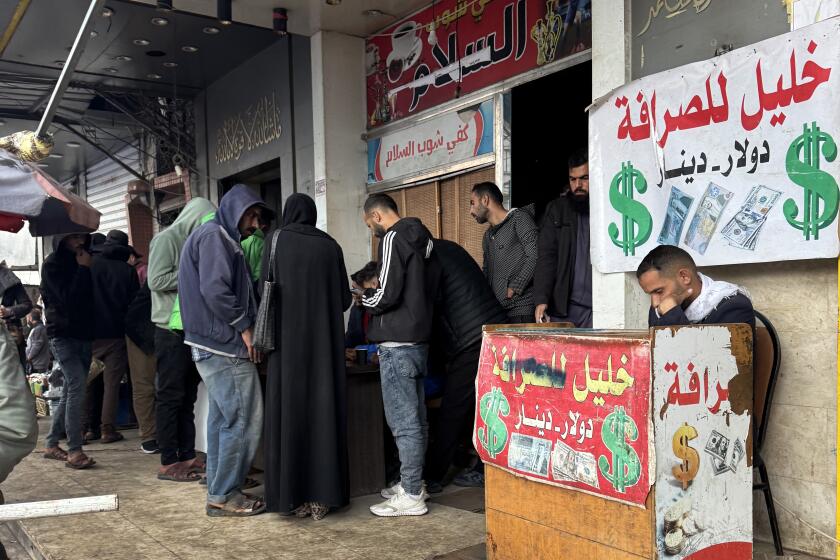Relief Groups Suspend Efforts in Southern Sudan
- Share via
NAIROBI, Kenya — A phalanx of international relief organizations suspended operations in southern Sudan on Wednesday in frustration over the groups’ failure to reach an agreement with guerrillas in the war-torn region over security concerns and the distribution of aid.
The abrupt departure of the dozen or so aid organizations could seriously jeopardize ongoing humanitarian relief programs in southern Sudan and put at risk the lives of tens of thousands of people.
The move, which comes as some donor countries are striving to wean developing nations off aid, strikes a blow at the viability of one of the world’s longest-running and largest charitable operations, and it throws into question the commitment of the Sudanese rebels to alleviate the suffering of the nation’s people.
Relief organizations such as Care International, World Vision, Oxfam, Save the Children and the Dutch arm of Doctors Without Borders, which are jointly responsible for the aid that reaches more than 1.5 million people in southern Sudan, said the decision to abandon operations there was made under duress.
The Sudan People’s Liberation Army, or SPLA, unexpectedly issued an ultimatum to aid groups Jan. 12, giving them until Feb. 29 to reach an agreement over the role of the rebels in distributing aid and providing security.
The SPLA is fighting for autonomy for the country’s south--which is largely Christian--from the predominantly Muslim north. At least 2 million people have died in fighting or war-related famine since 1983.
Aid officials said the SPLA agreement would have required them to work in accordance with the objectives of the rebels rather than based solely on humanitarian principles. The document lacked guarantees that assistance would go to the truly vulnerable, leaving room for the possible diversion of aid, and it included clauses that could reduce the ability of relief groups to guarantee the safety of their staff, officials said.
The relief workers also worried that if the rebels were allowed more control over the aid operations--for instance, charging for activities such as aircraft landings and movement in rebel-held territory--the efforts of humanitarian groups to remain impartial would be compromised.
“If we sign this agreement as it now stands, we question whether others will see that we have given away our neutrality,” said Nigel Marsh, communications manager for East Africa at World Vision.
“There has been a real soul-searching among the humanitarian agencies around the issue of principle,” said Jonathan Mitchell, East Africa regional director for Care International. “[They] have tried to make their decision as best as they could on the basis of principle, and not on the basis of protecting their programs or jobs, or anything like that.”
The rebels denied that they had ordered the aid groups to leave or that they were seeking to manipulate their operations in southern Sudan. Instead, they accused the organizations of trying to bully them.
“There should be no strings attached to humanitarian work,” said Samson Kwaje, a rebel spokesman. “We don’t want to regulate their activities. We want to be partners.”
The rebel ultimatum didn’t apply to U.N. agencies, such as the World Food Program and UNICEF, which have a separate agreement with the guerrillas. Several smaller aid organizations opted to sign the agreement and continue their operations as normal.
“We’ve had to sign this document in good faith, because we want to continue to save the lives of the people we’re working with, and to build the capacity of the local health providers,” said Magnus Wolfe Murray, regional director for the International Medical Corps, a Los Angeles-based group. “That’s our big mission. We feel that’s so important we can’t just let it go on a bunch of principles.”
Last week, the State Department condemned the rebel ultimatum and noted that any humanitarian consequences would “fall squarely on the leadership of the SPLA.” Washington has been generally supportive of the rebel group and is considering providing direct food aid to it, but U.S. officials said the rebels’ recent actions lessen the likelihood of that.
SPLA leaders blamed the government in Khartoum, which has criticized the rebels’ treatment of the aid agencies, for poisoning the groups against them. The rebels said they feel they are being punished for the breakdown of recent peace talks, which ended acrimoniously and without agreement in Nairobi last week.
“Most of the agencies that have pulled out operate in government-controlled area, and they have had a lot of pressure from Khartoum not to sign” the agreement, said Kwaje, the rebel spokesman.
More to Read
Sign up for Essential California
The most important California stories and recommendations in your inbox every morning.
You may occasionally receive promotional content from the Los Angeles Times.











